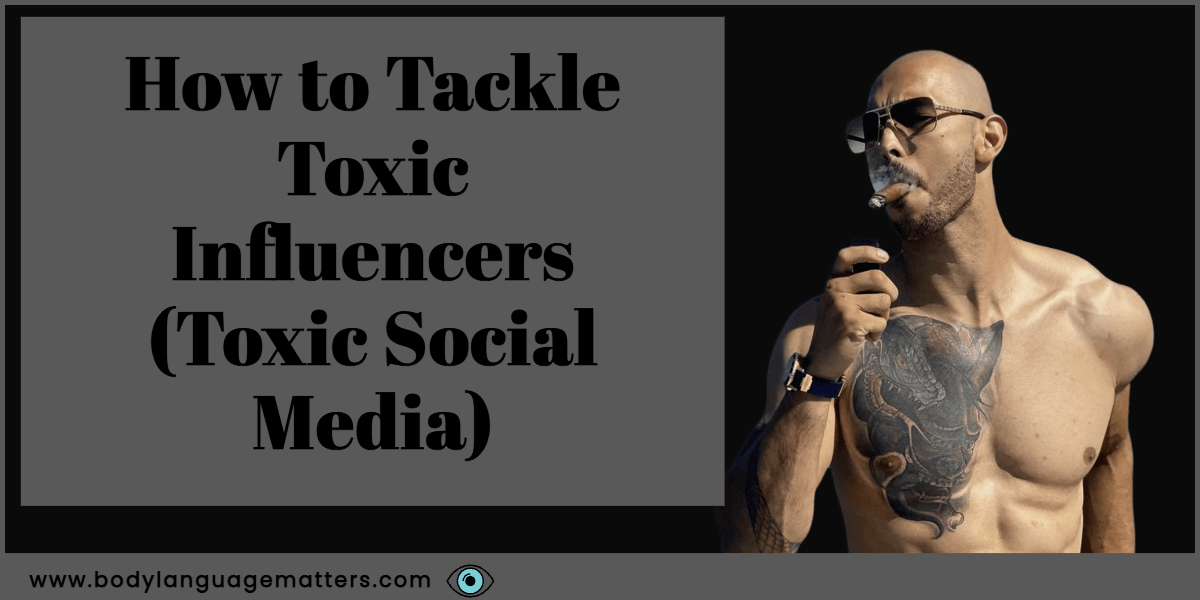Toxic influencers are individuals on social media platforms who spread negativity, promote harmful ideas, or exhibit toxic behavior.
It’s crucial to know how to handle such influencers to protect your mental health and maintain a positive online environment. In this article, we’ll guide you through the process of identifying and tackling toxic influencers.
Identifying Toxic Influencers. ?
Spotting red flags of toxic social media influencers
It’s essential to recognize the warning signs of a toxic influencer. Some red flags include consistent negative messaging, belittling others, spreading misinformation, or promoting harmful behavior. Be on the lookout for these indicators to safeguard yourself from their impact.
- Consistently negative messaging.
- Belittling or mocking others.
- Spreading misinformation or promoting conspiracy theories.
- Encouraging harmful behaviors or self-destructive habits.
- Demonstrating a lack of empathy or compassion for others.
- Using divisive language or promoting hate speech.
- Engaging in cyberbullying or online harassment.
- Manipulating or gaslighting their audience.
- Excessively self-promoting or exhibiting narcissistic behavior.
- Focusing on superficial aspects, such as appearance or material possessions, over personal growth and development.
How to stop your child from watching toxic social media.??
Open communication.
Maintain an open and honest dialogue with your child about their social media usage. Discuss the potential dangers of following toxic influencers and their impact on their mental health.
Education.
Teach your child how to identify red flags associated with toxic influencers. Help them understand the importance of critical thinking and discernment when consuming content online.
Parental controls.
Utilize parental control features on devices and social media platforms to restrict access to age-inappropriate content or specific users that you deem toxic.
Positive role models.
Encourage your child to follow positive role models and influencers who inspire, educate, and promote healthy behaviors.
Monitoring.
Regularly monitor your child’s social media activity to ensure they are not engaging with toxic influencers. Be respectful of their privacy but remain vigilant to keep them safe online.
Set boundaries.
Establish screen time limits and designate specific hours for social media usage. Encourage your child to engage in offline activities and hobbies, which can help to reduce their exposure to toxic influencers.
Lead by example.
Model healthy social media habits and avoid engaging with toxic influencers yourself. Your child is more likely to follow your example if you demonstrate responsible and thoughtful online behavior.
Foster open discussion.
Encourage your child to share their thoughts and experiences related to online content they consume. Create a safe and non-judgmental environment where they can express their concerns and ask questions.
Teach emotional resilience.
Help your child develop emotional resilience and self-confidence, so they are less likely to be influenced by toxic individuals. Teach them the importance of self-worth, empathy, and kindness.
Support system.
Build a strong support system for your child, including family, friends, and mentors, who can provide guidance and encouragement. By surrounding them with positive influences, they will be less likely to seek validation from toxic influencers.
Additional Ideas On How To Handle Toxic Influencers. ?♂️
Setting Boundaries.
Limiting social media exposure.
Limit your exposure to social media platforms where toxic influencers thrive. Set specific times for checking social media, and avoid engaging with it during other parts of the day. This will help reduce the impact of toxic influencers on your life.
Muting or unfollowing.
Muting or unfollowing toxic influencers will decrease their presence in your feed, allowing you to focus on more positive content. Don’t be afraid to eliminate people from your online environment if they’re negatively affecting your well-being.
Engaging Mindfully
Educate yourself.
Educate yourself on the issues and topics that toxic influencers discuss. By understanding the facts, you can differentiate between genuine information and misinformation. This will enable you to make informed decisions and minimize the influence of toxic individuals.
Avoiding online arguments.
Engaging in online arguments with toxic influencers can be emotionally draining and counterproductive. Instead, focus on promoting positive discourse and engaging with like-minded individuals who share your values.
Empowering Yourself. ?
Identifying personal values.
Know your personal values and beliefs. By being clear about what you stand for, you can avoid being swayed by the opinions of toxic influencers. Stand firm in your convictions and surround yourself with individuals who share your values.
Embracing positive influences.
Seek out positive influences on social media platforms. Follow people who inspire, motivate, and encourage you to be your best self. By focusing on positivity, you can counterbalance the negative effects of toxic influencers.
Reporting and Blocking. ?
Reporting harmful content
If a toxic influencer’s content violates the platform’s guidelines or promotes harmful behavior, report it. By doing so, you’re actively working to create a safer online space for everyone.
Blocking as a last resort
If you’ve tried all other methods and still find yourself affected by a toxic influencer, consider blocking them. Blocking may seem extreme, but it’s an effective way to protect your mental
The impact on your mental health. ?
Toxic influencers can negatively affect your mental health, leading to anxiety, depression, or self-esteem issues. Constant exposure to such content may distort your perception of reality and promote unhealthy behaviors. Identifying these influencers is the first step to protecting yourself.
Frequently Asked Questions
What are the signs of a toxic influencer?
Toxic influencers often spread negativity, belittle others, share misinformation, or promote harmful behaviors. Recognizing these red flags can help you identify and avoid such individuals.
How can I limit my exposure to toxic influencers?
Limit your social media usage to specific times, mute or unfollow toxic influencers, and engage with positive influences to reduce your exposure to negativity.
Why is it important to educate myself on the topics toxic influencers discuss?
Being knowledgeable about the issues they discuss helps you differentiate between genuine information and misinformation, enabling you to make informed decisions and minimize their influence.
When should I consider blocking a toxic influencer?
Blocking should be a last resort after trying other methods, such as muting, unfollowing, or reporting. If a toxic influencer continues to negatively impact your mental health and well-being, blocking may be necessary.
How can I promote a positive online environment?
Focus on engaging with like-minded individuals, share positive content, and report harmful behavior or content that violates platform guidelines. By actively fostering a supportive online community, you can help create a more positive environment for everyone.
Final Thoughts
Tackling toxic influencers is essential to protect your mental well-being and foster a healthy online experience. By identifying red flags, setting boundaries, engaging mindfully, empowering yourself, and reporting or blocking when necessary, you can successfully navigate the world of social media and minimize the impact of toxic influencers on your life. Surround yourself with positivity and embrace the power of your values and convictions to maintain a balanced and fulfilling online presence.

